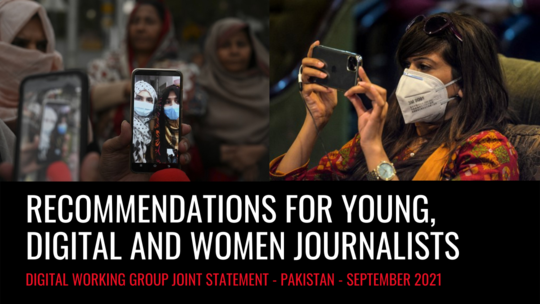The research was conducted by activists from the Freedom Network, the Young Journalists Forum Lahore and the Rawalpindi Islamabad Union of Journalists, with the support of the National Endowment for Democracy (NED), under the IFJ and the Pakistan Federal Union of Journalists (PFUJ) project “Promoting Labour Rights, Gender Equality and Freedom of Association in Pakistan’s Media”.
Endorsing the findings of research of Pakistan’s digital media landscape, a new Digital Working Group (DWG), formed on September 7 and put forward joint recommendations from the three research efforts. The group also expressed grave concern over increased censorship and crackdowns on media in Pakistan, particularly in online spaces.
Specifically, the three IFJ digital media research pilot projects highlighted that while there has been a massive growth in digital media and digital only journalists, the burgeoning sector is neither appropriately acknowledged, represented nor valued in terms of professional membership and in advocacy issues pertinent to this sector.
The research also found that the participation of women and young journalists within unions was disproportionately low. Despite unions’ acknowledged willingness to increase diversity and representation, this was yet to be reflected in union executives and in membership drives.
Groups from the three research groups in a research evaluation meeting this month put forward collective recommendations:
For Pakistan’s media:
- Pakistan’s media should develop a common strategy to defend journalists’ rights, freedom of expression and media pluralism for all media – not just reflect the issues of legacy media.
- A widely accepted ‘journalists charter’, incorporating the digital media landscape, is needed to unite and reflect Pakistan’s media today.
For media owners
- Dialogue between media management and unions should be prioritized so that journalists’ labour rights issues such as low and delayed salary pay and illegal sackings, as well as the issues of women, digital and young journalists, can be addressed.
- Digital media managers should be given comprehensive training on labour and media rights.
For young and digital workers
- Young and digital journalists need to urgently develop their capacities on collective bargaining on the common issues confronting them.
- Young, digital and female journalists should seek to secure dialogue with the various media stakeholders with a view to increase their meaningful participation in the media sphere and in unions.
For unions and press clubs
- Unions and press clubs should revise their respective constitutions to make them more inclusive, participatory and democratic. This will, by effect, attract more women, digital and young journalists to their membership and strengthen unions.
- Training for executive committees of unions and press club is needed to facilitate the reform of unions’ charters and constitutions.
- Comprehensive membership drives targeting women, young and digital journalists should be supported and membership processes should be reviewed to overcome the hurdles and obstacles for young, digital and female media workers to secure membership in a timely process.
- ‘Digital organizing’ training within media unions and press clubs should be prioritised.
Journalists in the studies alsoexpressed concerns that the media is re-orienting towards private and state interests rather than the public interest. Many journalists surveyed reported being laid off, having salaries reduced or not being paid for extended periods.
The downsizing of Pakistan’s legacy media runs parallel to the emergence of a thriving digital media ecosystem, but one that has led a decrease in formal and full time employees and an increase in freelance and part time media workers.
The ‘Digital Working Group’ included Adnan Rehmat, Iqbal Khattak,Faizah Hassan, Shakeel Ahmed, Rizwan Ahmed Khan, Kanwar Uzair, Waheed Khan, Kamran Khalid, Farhat Fatima, Momina Sheeraz, Salman Yousuf, Sana Khalid and Muhammad Umer Javed as members .
The IFJ said: “Despite the increased pace of media digitalisation and growing number of ‘digital only’ journalists in Pakistan, they are still alarmingly not adequately represented, protected in their labour rights or defended in the challenges that confront the. The IFJ hopes that the efforts by digital media workers will be given due consideration by all stakeholders so that critical reform and engagement can be achieved.”

